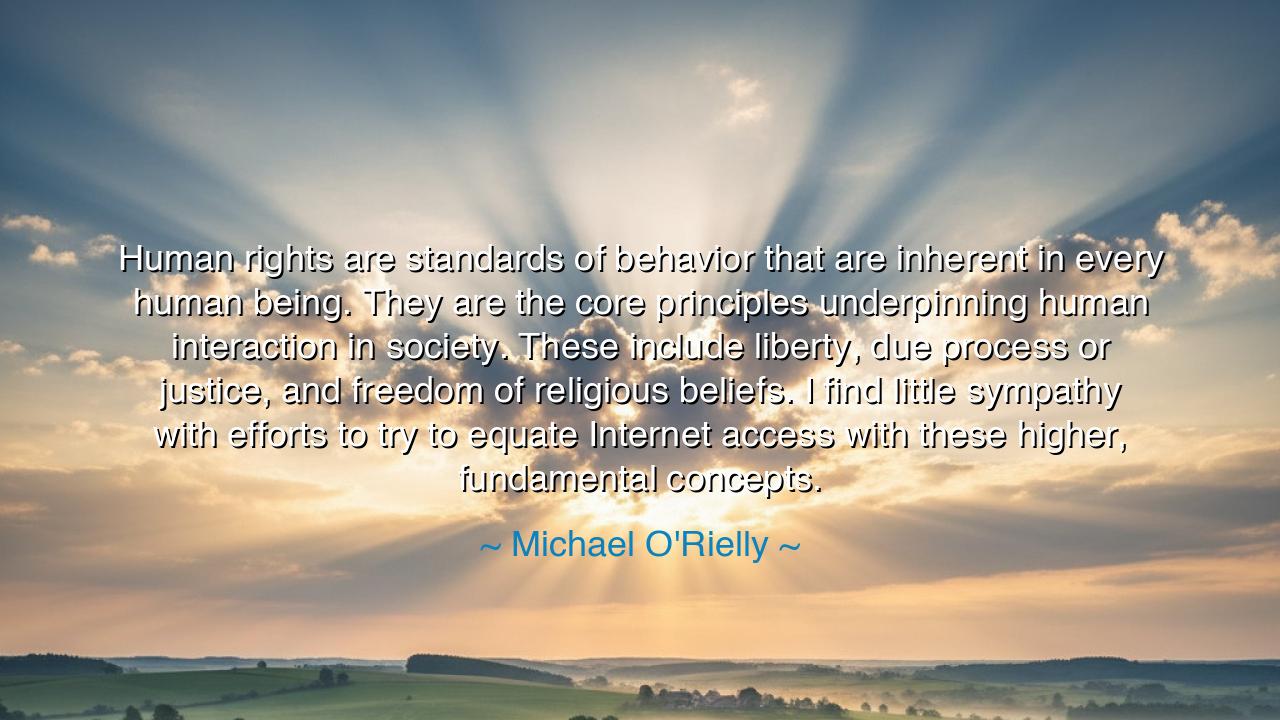
Human rights are standards of behavior that are inherent in
Human rights are standards of behavior that are inherent in every human being. They are the core principles underpinning human interaction in society. These include liberty, due process or justice, and freedom of religious beliefs. I find little sympathy with efforts to try to equate Internet access with these higher, fundamental concepts.






Hear, O seekers of wisdom, the voice of Michael O’Rielly, who proclaimed: “Human rights are standards of behavior that are inherent in every human being. They are the core principles underpinning human interaction in society. These include liberty, due process or justice, and freedom of religious beliefs. I find little sympathy with efforts to try to equate Internet access with these higher, fundamental concepts.” These words draw a line of fire between what is eternal and what is fleeting, between the pillars of human dignity and the tools that men create for convenience. He calls us to remember the roots of our humanity, lest we mistake the branches for the tree itself.
The meaning is plain yet profound: human rights are not granted by kings, governments, or machines. They are inherent, woven into the very fabric of being. Liberty, justice, and freedom of belief are not luxuries, nor inventions of law, but eternal truths. They are the standards by which men and women measure dignity itself. To equate these with Internet access, O’Rielly warns, is to confuse the essence of what makes us human with the instruments of human design. The one is timeless; the other is temporal.
The ancients spoke similarly when they declared that laws must rest upon natural rights—truths that exist beyond parchment and decree. The Stoics taught that every man, slave or emperor, bore within him a spark of divine reason that granted dignity and equality. The American Declaration of Independence echoed this eternal strain: that all men are endowed with certain unalienable rights. These rights are not chosen, but born. And though the ages change—though the chariots become engines, and scrolls become screens—the essence of human dignity does not shift.
History shows the peril of confusing tools with principles. Consider the tale of the printing press. When Gutenberg’s invention spread knowledge across Europe, it was hailed as a revolution. Yet the right to speak freely was not born with the press; it was merely amplified by it. Tyrants still sought to silence voices, with or without the tool. The principle of free thought is higher than the paper, the ink, or the machine. So too with the Internet: it may magnify liberty, it may carry the voice of the oppressed across borders, but it is not the source of liberty itself.
O’Rielly’s words burn against a growing confusion: the belief that because a tool is powerful, it must therefore be a right. But rights are not measured by bandwidth, nor by wires, nor by screens glowing in the night. Rights are measured in justice, in the freedom to worship or not, in the liberty to speak truth without fear, in the due process that protects even the weakest from the hand of the mighty. If these pillars crumble, no connection—digital or otherwise—will preserve the dignity of man.
The lesson, therefore, is this: hold fast to the eternal, and do not mistake the temporary for the timeless. Cherish technology as a gift, but do not worship it as a god. Defend liberty before you defend access; fight for justice before you fight for convenience. In your life, honor first the principles that make society whole—fairness in dealings, respect for others’ beliefs, protection of the weak. Then, let your use of tools like the Internet be guided by these higher truths, not confused with them.
What practical steps can you take? Guard your speech with truth, whether online or face-to-face. Defend those who are denied justice, regardless of the medium through which their cries reach you. Support laws and customs that preserve real human rights, not just digital privileges. And above all, remember that technology will change a thousand times in your life, but the essence of what it means to be human will not.
So let it be written upon your heart: tools pass away, but rights endure. The Internet may carry your voice to the ends of the earth, but only liberty, justice, and freedom of belief give that voice its meaning. Protect these, and you protect the soul of mankind. Forget them, and though every man be connected by wires and waves, he will stand alone, stripped of dignity, and enslaved by the illusion of progress.






AAdministratorAdministrator
Welcome, honored guests. Please leave a comment, we will respond soon